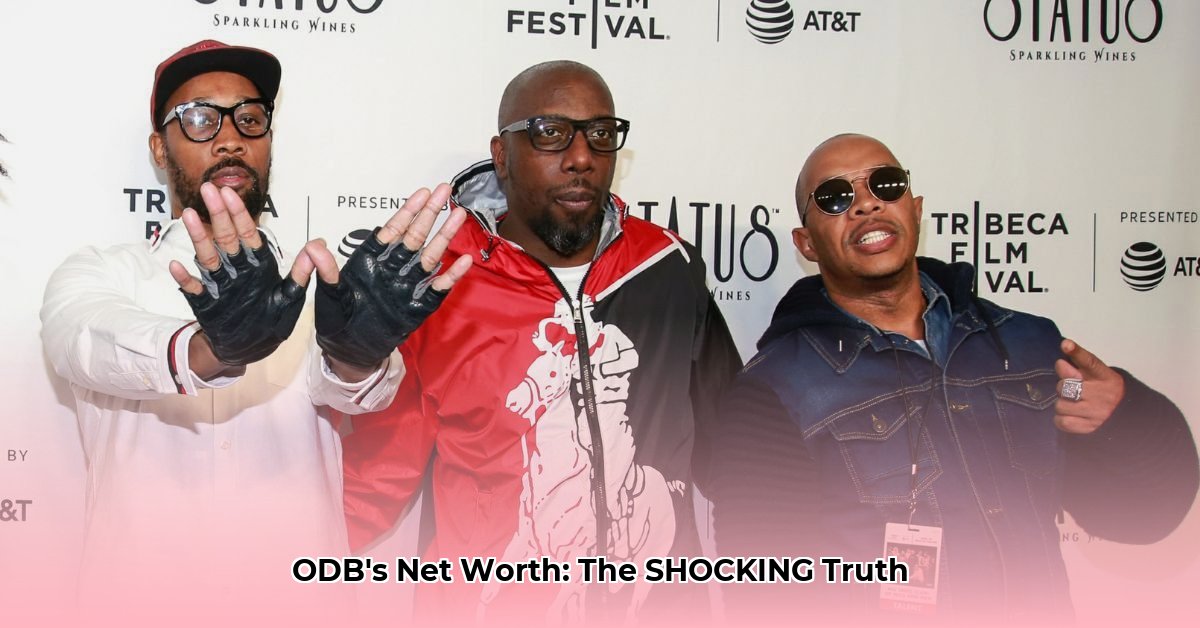
Ol' Dirty Bastard. The name alone evokes images of raw talent, unpredictable energy, and a unique style that redefined hip-hop. But beyond the music and the legend lies a complex financial story, one that's as perplexing and intriguing as the man himself. Determining ODB's net worth at the time of his death isn't simply a matter of looking up a number; it’s a deep dive into a life marked by both extraordinary success and significant challenges. This article unravels the mystery surrounding his finances, comparing his trajectory with that of his Wu-Tang Clan brethren and revealing the surprising lessons hidden within his story. For further comparison, see this other rapper's net worth.
ODB's Financial Enigma: A Wu-Tang Clan Case Study
The Wu-Tang Clan's impact on hip-hop is undeniable. Their collective success catapulted nine distinct artists into the spotlight, each forging a unique path to wealth, or, in some cases, a more precarious financial situation. While some members, like the RZA, built multi-million dollar empires through savvy business ventures extending beyond music, others steered different courses. This range of outcomes makes understanding ODB's financial circumstances particularly challenging and fascinating.
ODB's Career: A Tapestry of Triumphs and Troubles
ODB's career arc mirrored his unpredictable personality. His raw talent and singular style cemented his place in hip-hop history, yielding significant solo success. However, legal battles and personal struggles frequently overshadowed his accomplishments. These factors likely significantly impacted his financial stability. While precise figures remain elusive, it's plausible that these challenges hindered his ability to effectively manage his resources. The resulting lack of clarity about his net worth underscores the complexities inherent in assessing the finances of deceased artists, particularly those with unconventional life paths.
Unraveling the Discrepancies: The Challenges of Estimating ODB's Wealth
Determining ODB's net worth is an intricate task, akin to piecing together a fragmented puzzle with missing elements. His financial records, if complete, likely provide an incomplete picture at best. Unpaid taxes, substantial legal fees, and personal expenses likely significantly reduced his overall wealth. Unlike some more business-minded Wu-Tang members, ODB's approach to finances may have lacked structure. The fact that he is no longer alive adds further complexity. Estimates vary widely – from hundreds of thousands to several million dollars – reflecting the inherent difficulty in accurately assessing the financial situation of a deceased individual with a complex history.
A Comparative Analysis: ODB and His Wu-Tang Clan Brethren
Let's examine the contrasting financial trajectories within the Wu-Tang Clan:
| Member | Estimated Net Worth (USD) | Key Factors Contributing to Wealth |
|---|---|---|
| RZA | $20 million+ | Successful film scores, production company, shrewd business ventures |
| Method Man | $15 million+ | Strong solo career, acting roles, strategic brand deals |
| GZA | $10 million+ | Long and successful solo career, wise investments |
| Ghostface Killah | $10 million+ | Extensive discography, collaborations, diverse brand partnerships |
| ODB | ~$1 million - $4 million (highly variable) | Less diversified income, legal issues, personal challenges |
| Others | Various ($1M-$4M range) | Less commercially successful solo careers, fewer diverse income streams |
This table starkly illustrates the financial disparity within the group. The contrast between the RZA and Method Man, who diversified their income streams beyond music, and ODB highlights the multitude of factors – talent, business acumen, and financial management – that influence wealth accumulation in the music industry. Did ODB lack the business sense of his more financially successful counterparts? The evidence suggests it's a contributing factor.
Lessons from ODB's Legacy: Financial Planning in the Music Industry
ODB's story serves as a cautionary tale, underscoring that immense talent doesn't automatically translate to financial security. While his musical genius generated significant income, his financial struggles highlight the crucial importance of sound financial planning and professional guidance, particularly in the volatile music industry. His legacy is a complex case study, one that continues to spark debate about his actual net worth. It teaches us that success in the music industry requires more than just talent; smart financial decisions and responsible management are paramount for long-term prosperity. His story remains a compelling reminder of the unpredictable nature of wealth creation, even for highly talented individuals.